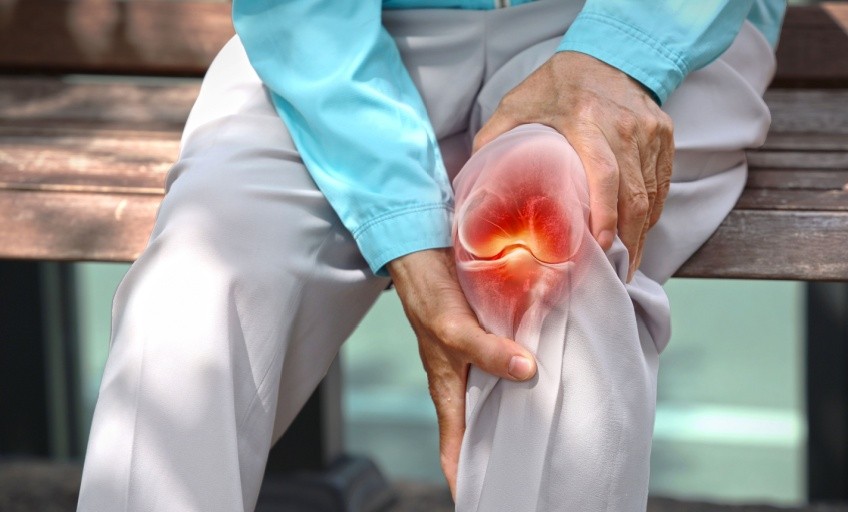Achy joints qualify as the most well-known symptom of rheumatoid arthritis. But did you know that the chronic joint condition can also increase your risk of heart disease?
What you need to know:
- Understanding the link between joints and the heart
- Different joint pains as a potential indicator of heart disease
- When does joint pain signify heart trouble?
- 4 Ways to protect your heart and joints
Understanding the link between joints and the heart
Joint pain and inflammation can be linked to heart health:
- Rheumatoid arthritis (RA): This chronic inflammatory disease can cause joint pain and swelling, which can damage cartilage and lead to atherosclerosis, atrial fibrillation, and other health issues that increase the risk of heart disease. People with RA are almost twice as likely to develop heart disease as those without it.
- Osteoarthritis (OA): This degenerative joint disease can increase the risk of cardiovascular disease (CVD) or heart failure by almost three times. The link is strong especially when arthritis affects certain joints, such as the knee and hip.
Other health issues that can increase the risk of heart disease for people with RA include:
- Obesity,
- High blood pressure,
- Cholesterol levels, and
- Smoking.
Different joint pains as a potential indicator of heart disease
Let us look at the various types of joint pain as possible indicators of heart disease:
Jaw pain and angina
Jaw pain can be a symptom of angina, a temporary chest pain or pressure that occurs when the heart’s oxygen needs aren’t met by the amount of blood supplied. This can happen when the arteries are narrowed. Angina can also cause pain or discomfort in the jaw, neck, back, shoulders, arms, and throat. The pain can feel like heaviness, tightness, squeezing, or pressure. Some people with angina may feel chest discomfort but no pain at all. Other symptoms of angina include dizziness, fatigue, and shortness of breath.
Shoulder pain

Shoulder pain can be a potential warning sign of a heart attack. During a heart attack, shoulder pain can feel like radiating pain that starts in the chest and moves to the left or right shoulder. It can also move back and forth between the shoulders and may involve the upper back, shoulder blades, and chin. However, shoulder pain can have other causes. A study found that people with the most heart risk factors were almost five times more likely to have shoulder joint pain or rotator cuff issues.
Knee pain
Knee pain can be related to heart problems:
- Osteoarthritis (OA): People with OA in the knee and hip are almost three times more likely to develop cardiovascular disease (CVD) or heart failure.
- Rheumatoid arthritis (RA): This chronic inflammatory joint disease can cause joint pain and swelling, damage cartilage in your joints, harden the arteries, and slow blood flow to your heart and other organs.
- ACL injuries: A Harvard Medical School study suggests that injuries to ACL, a ligament in the knee, may drive cardiovascular risk.
- Peripheral Artery Disease: PAD involves the narrowing of the arteries in the legs, leading to pain and cramping during physical activity (claudication).
When does joint pain signify heart trouble?
Let us look at the potential ways joint pain can signify heart trouble:
Persistent joint pain without a clear cause
Persistent joint pain without a clear cause could, in rare cases, be a sign of heart trouble:
- Rheumatoid arthritis is a high-risk factor for developing heart disease.
- Gout, a form of arthritis characterized by sudden, severe joint pain (usually in the big toe), has been linked to an increased risk of heart disease.
- Infective endocarditis is an infection of the heart valves.
- Autoimmune disorders, such as lupus, can increase the risk of heart problems.
- Coronary artery disease can, in rare cases, pose pain in the joints.
Joint pain accompanied by chest pain
Joint pain accompanied by chest pain can signify heart trouble, particularly if the pain radiates to the shoulder, arm (especially the left arm), neck, or jaw. This combination of symptoms may indicate:
- Referred Pain from a Heart Attack
- Angina (Chest pain due to reduced blood flow to the heart)
- Pericarditis (Inflammation of the heart lining)
Other concerning signs include shortness of breath, sweating, nausea, or dizziness.
Unexplained weight loss
Unexplained weight loss combined with joint pain could signal heart trouble. Infective endocarditis, a heart infection, may cause both symptoms due to chronic infection and inflammation. In rheumatoid arthritis, chronic inflammation can lead to weight loss and an increased risk of heart disease. Additionally, certain cancers that impact the heart can cause these symptoms. If you experience joint pain with unexplained weight loss, a thorough medical evaluation is essential to rule out underlying heart issues.
4 Ways to protect your heart and joints
Regular exercise and a healthy weight

Movement is important for managing these conditions. Start slowly and adopt an exercise routine that fits your current fitness level. Try these arthritis-friendly exercises:
- Walking can give your body a chance to get up and about and work out.
- Swimming pool-based exercises can be safe and effective, and the buoyancy of water can relieve stress on joints.
- Biking, whether you prefer a stationary bike or getting out on the trails, can be an effective workout.
- Elliptical machines can be another option for getting a low-impact workout that is easier on your joints.
Keep your weight in check with these exercises.
Balanced diet and hydration
Choose foods that are nutrient-dense, plant-based, and not processed. Consider having an anti-inflammatory eating plan like the Mediterranean diet, which includes:
- Fresh fruits and vegetables
- Whole grains like whole-wheat bread and brown rice
- Legumes and beans like chickpeas, kidney beans, or lentils
- Nuts and seeds like walnuts, almonds, cashews or peanuts
- Fish and seafood rich in omega-3 fatty acids
- Extra virgin olive oil
- Herbs and spices like garlic, oregano, coriander, and cumin
Keep yourself adequately hydrated. Drink eight glasses of water a day.
Stress management
Your body’s natural response to stress can worsen the inflammation and joint pain. Manage stress by following the ways mentioned:
- Control your breathing: Try breathing techniques such as alternate-nostril breathing, box breathing, etc.
- Release physical tension: Practise progressive muscle relaxation and slowly recognize and relax any tension in your body.
- Get moving: You can try yoga poses like cat-and-cow stretch, knees to chest, or yoga nidra.
- Practise mindfulness: Practise meditation, journal your thoughts, live in the present, and enjoy each moment instead of worrying.
- Connect with nature: Walking in nature and breathing fresh air can help you unwind and relax.
Regular checkups
Get an annual cardiovascular risk assessment. Get screened by your doctor for risk factors like cholesterol and blood pressure. These are easier to address sooner than later. Routine checkups allow for monitoring the risk factors, timely diagnosis, and managing underlying conditions. Even if you feel well, these checkups help ensure that any subtle signs of disease are addressed before they become serious, contributing to better long-term health and well-being.
There is a significant connection between arthritis and heart health. Keep your joints and heart healthy by following these tips.
Stay tuned to the Activ Living Community. Keep up to date with the latest health tips and trends through expert videos, podcasts, articles, and much more on nutrition, fitness, mindfulness, and lifestyle conditions like Asthma, Blood Pressure, Cholesterol, and Diabetes. Activ Living ke saath sahi sehat ki shuruat ABHI karo.
You may also be interested in the following blogs:
Popular Searches
How to lower blood pressure | Fruits good for liver | Unhealthy foods | Ragi Benefits | Basal Metabolic Rate | Acupressure points for High Blood Pressure | Ayurvedic medicine for blood pressure | How to control cholesterol at home | Homeopathy for Asthma | Biological Age | Home remedies for TB | Natural beta blockers | Negative effects of internet | Types of walking | Blood pressure calculator | Blood sugar calculator | BMI Calculator





 1800-270-7000
1800-270-7000








